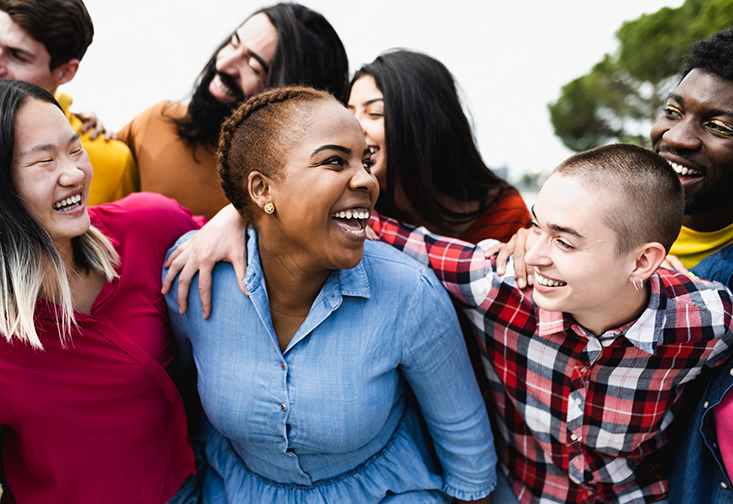By Matthew Cimitile, University Communications and Marketing
Although teen pregnancies in the U.S. have been on the decline for decades, substantially higher levels of pregnancies, along with trafficking and sexual violence, persist among marginalized communities.
A research project spearheaded by faculty on the USF St. Petersburg and Tampa campuses working with community partners locally and in Savannah, Georgia seeks to reduce unintended teen pregnancies, sexually transmitted infections and incidents of trafficking for marginalized youth.
Researchers are implementing a sexual health education program called Choosing Myself, which is designed for youth who are or have been in the juvenile justice system and from populations such as LGBTQ+ individuals. Along with reducing many negative aspects of sexual relationships, the project hopes to enhance knowledge of healthy relationships while increasing self-esteem.
This sexual health education initiative recently received a $800,000 grant from the U.S. Department of Health and Human Services (HHS) to conduct a two-year project that reaches 200 youth between the ages of 13-18.
“Choosing Myself is distinctive compared to other sexual health education programs as it takes into account the lived experiences and circumstances of marginalized populations, focuses on individuals’ goals and how those experiences and goals may impact sexual health and relationships,” said Jill McCracken, a USF professor of English and Women’s and Gender Studies, and one of the leaders of the project. “Our hope is that through this program – providing skills and resources and talking about healthy relationships and what healthy communication looks like – participants can better identify red flags of toxic situations.”
Though there are a number of existing sexual health and teen pregnancy prevention programs, what distinguishes Choosing Myself is the incorporation of trauma-informed care, structural racism and meeting youth where they are to provide them with information and resources for the future.
Using this education framework, researchers and facilitators with the nonprofit Allies for Healing will visit juvenile justice facilities to deliver the program to 200 participants, divided up into about 20 classes of 10 students over a two-year period.
Allies for Healing will begin partnering with youth-serving organizations in the greater Tampa Bay and greater Savannah areas in early 2023 to begin facilitating the program. Partner organizations will include juvenile justice facilities, foster care programs and group homes, and treatment facilities.
The curriculum will cover topics ranging from birth control and STI prevention to boundaries, consent and healthy relationships. In each class, students are led through a mindfulness activity and are given the opportunity to reflect on their personal values, experiences and how they feel about the subject matter.
“Choosing Myself is an exciting new program that values inclusivity, strengths and positivity and provides a truly comprehensive education for some of the most marginalized youth in our communities,” said Jessica Swanson, program director and interim executive director for Allies for Healing. “We're ready to jump in and begin working with organizations in the new year to create safe and trauma-informed spaces for young people to receive this critical education.”
Prior to classes starting, youth will take surveys and participate in focus groups to gauge their sexual health knowledge and understanding. Then throughout the program and after, researchers will collect data via daily behavior logs, informal debriefings with youth, interviews with facilitators, focus groups and surveys to gauge whether the curriculum is having its intended impact of reducing sexual violence and leading to healthier relationship outcomes.
“We will constantly measure the effectiveness of the curriculum in terms of, is it helping participants make healthier choices, such as using contraception, helping them think through what is safe sex and aligning those with their life goals,” said Cheryl Vamos, associate professor in the College of Public Health and another project leader. “Based on rapid feedback from participants and facilitators as the program commences, we can also make changes that will lead to improvements to make it more impactful for this and future cohorts.”
Vamos added that the entire evaluation process will also be informed by a youth advisory board, made up of teens who have gone through the Choosing Myself curriculum in the past. This group will provide input on the curriculum, evaluation questions, discussion topics and more.
At the conclusion of the two-year program, researchers expect data to show that the curriculum was impactful in leading to short-term results of better sexual health knowledge, greater contraceptive use and a reduction in nonconsensual sexual activity. If so, McCracken said the research team plans to apply for a larger grant to scale-up the project to involve more justice-involved and marginalized youth, building upon the program’s success and ultimately achieving the goals of reducing trafficking and unintended pregnancies in marginalized populations.
This specific sexual education curriculum, which was informed by years of research and best practices, has been utilized by McCracken before at much smaller scales. She jump-started a program that provided sexual education geared towards young women who were trafficked through several internal USF grants and awards, totaling $27,000. Research and data that came out of that work informed the application used for the HHS grant.
“I’m incredibly proud we are able to begin this project and work with terrific partners on the ground to bring this critical education to communities,” McCracken said. “Comprehensive sex ed is a significant way that we can reduce unwanted pregnancies and end trafficking and give people a better understanding of the red flags of dangerous relationships so they can keep themselves safe.”
McCracken, Vamos and the team are working to build out the youth advisory board as well as a community advisory board to ensure programming is reflective of and centered on the communities the project serves. If organizations in Tampa Bay and Savannah are interested in getting involved, please contact McCracken at mccracken@usf.edu.
